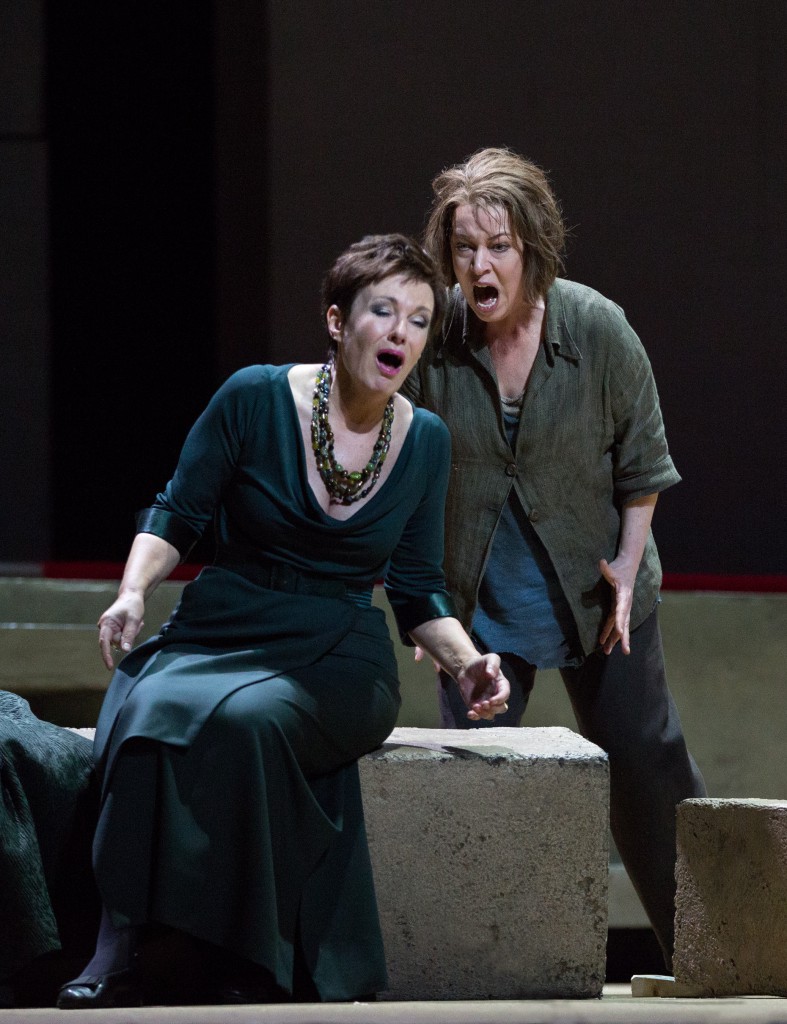Stemme, Meier light a fire in Met’s probing “Elektra”
So often in recent years, the Metropolitan Opera has been afflicted by late-season fatigue, putting up half-ready revivals in April and May that barely approach the company’s standard.
Not so in 2015–16: with excellent new productions and a handful of superb revivals in March and April, the Met is heading for an unusually strong finish.
On the docket for Thursday night was the season premiere of Richard Strauss’s masterpiece Elektra, in the production by Patrice Chéreau, which originally debuted at the Aix-en-Provence Festival in 2013. The director alas did not live to see the premiere of the staging, but since then the project has developed a life of its own, touring the world to critical acclaim. Though not without its failings, the presentation was an ordeal of harrowing intensity at its Met premiere on Thursday.
Much of that intensity, naturally, was due to the searing performances by this run’s splendid cast. Nina Stemme’s memorable portrayal of the title role is one of the great performances heard at the company this season. Chéreau’s staging focuses on Elektra’s captivity, drawing from Orest’s later shock at her condition to portray a squalid, cruel prison as the entire extent of her world.
Stemme brought an obsessive energy to her interpretation. From her first moments we see Stemme’s Elektra as a woman living in degradation, driven mad, broken in all but her drive to avenge her father’s death by killing her mother Klytämnestra and her lover Aegisth.
Her journey seemed not so much an arc as a linear progression–as soon as we see her she is clearly a victim of abuse, over the course of the drama she is abused further, and eventually achieves the revenge she has been plotting since years before the opening curtain. But the depth of Stemme’s portrayal was magnificent, making even the observation of her clear trajectory a thrilling experience. She kept an unwavering commitment to her vision of the role, and her pain was difficult to watch—even if we felt no joy at her resolution, she demanded sympathy throughout the opera. And to top it off, she sang with real beauty in a part that asks her to deliver harsh, darting music with scant opportunities for lyricism.
As her sister Chrysothemis, Adrianne Pieczonka was equally brilliant, providing a grounded counterweight to Elektra’s turmoil. There was at times a hardness in her voice, but she sang with tremendous urgency and managed some terrific legato singing in a persuasive, earnest account of her monologue “Ich kann nicht sitzen,” one of the opera’s more lyrical moments. Eric Owens was a welcome addition as Orest; at his first entrance, he sang with cryptic, chilling calm before revealing his true identity. There is more gravel in the voice these days, but the hint of roughness perfectly fits the role. Less successful was the debut of Burkhard Ulrich, who shouted in the admittedly thankless role of Aegisth.
Waltraud Meier, at sixty, seemed to defy all effects of the passage of time as Kyltämnestra. Her voice still has astonishing body and attractive tone, capable of soaring at its top. Her performance of the lament “Ich habe keine guten nächte” was captivating, showing a psychological depth to her character that almost rivaled Elektra’s. Her vision of Klytämnestra was uncommonly sympathetic: no domineering banshee, but a woman wounded and tormented by her past.
It takes an excellent conductor to make the most of this score, and one could hardly ask for a better interpreter to tease out its intricacies than Esa-Pekka Salonen. He demonstrated a keen understanding of the opera’s every detail, and communicated them in a texturally rich, nuanced reading.
The orchestra sounded glorious under his baton—the score is largely dominated by sharp teeth of winds and brass, but moments of warm, velvety strings shone through at the work’s most lyrical moments. His reading was taut, bristling, and amazingly expressive, a narrative force in its own right. The murmur of strings just before Klytämnestra’s murder was just one of many hair-raising sounds to come out of the pit.
The chief virtue of the Chéreau staging is that it is a supportive vehicle for such an ensemble, and surely some credit for the vivid performances of the cast is due to the stage director Vincent Huguet. But while the visual aesthetic of the production does not feel far astray from the musical aesthetic of much of the score, Chéreau’s final project is not quite so visionary as advertised.
The oppressive blandness of Richard Peduzzi’s sets makes a Soviet office building look like Blenheim Palace. The production gives no sense of place whatsoever outside the confines of Elektra’s prison, to the point that, as characters disappear into the wings, one begins to question whether there is such a thing as object permanence in the world of the opera.
Of course, this is a conscious choice—it forces us to think of the actions and motives of the characters as the only driving forces, and therefore the only real points of interest, in the piece’s drama. And it explains the bleakness of Elektra’s existence while neatly dodging her place in the cyclical mythology of the cursed House of Atreus, with which the libretto does not substantially engage.
Yet at the same time, this vision of the world actually dulls the effect of the story’s violence, which in the Greek dramatic tradition is so vivid—surely, in a nihilistic nightmare such as this, double-homicides must occur at least thrice a day?
More importantly, the concrete-and-steel wasteland has itself become a kind of cliché, a shorthand shortcut to “psychodrama”: Does the gray bareness of the stage really give us insight into the mind of the character? Or do we simply imagine that we are somehow inside Elektra’s head because the spartan aesthetic signals that we ought to be?
Elektra runs through May 7 at the Metropolitan Opera. metopera.org
Eric C. Simpson is Associate Editor of The New Criterion







